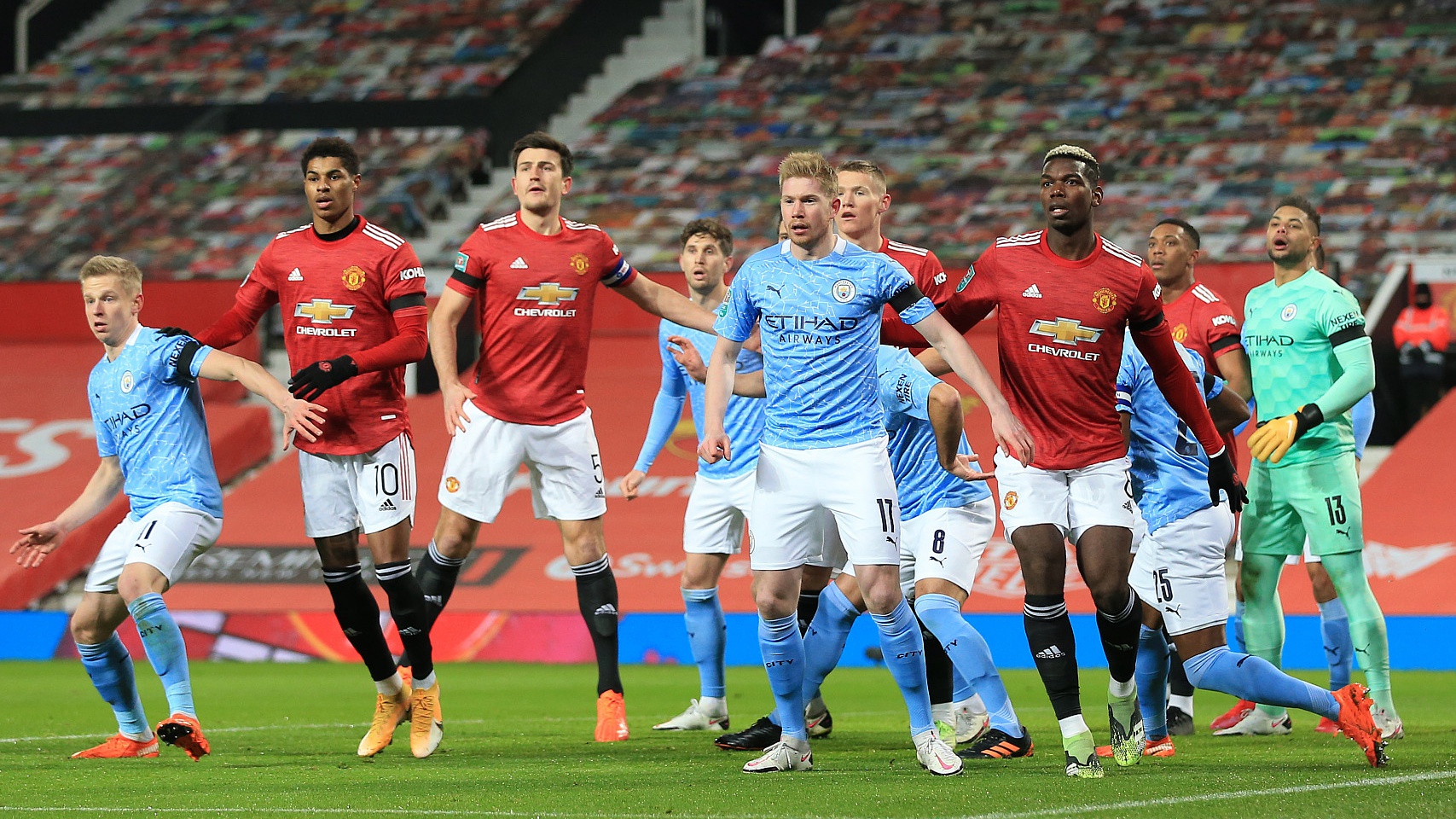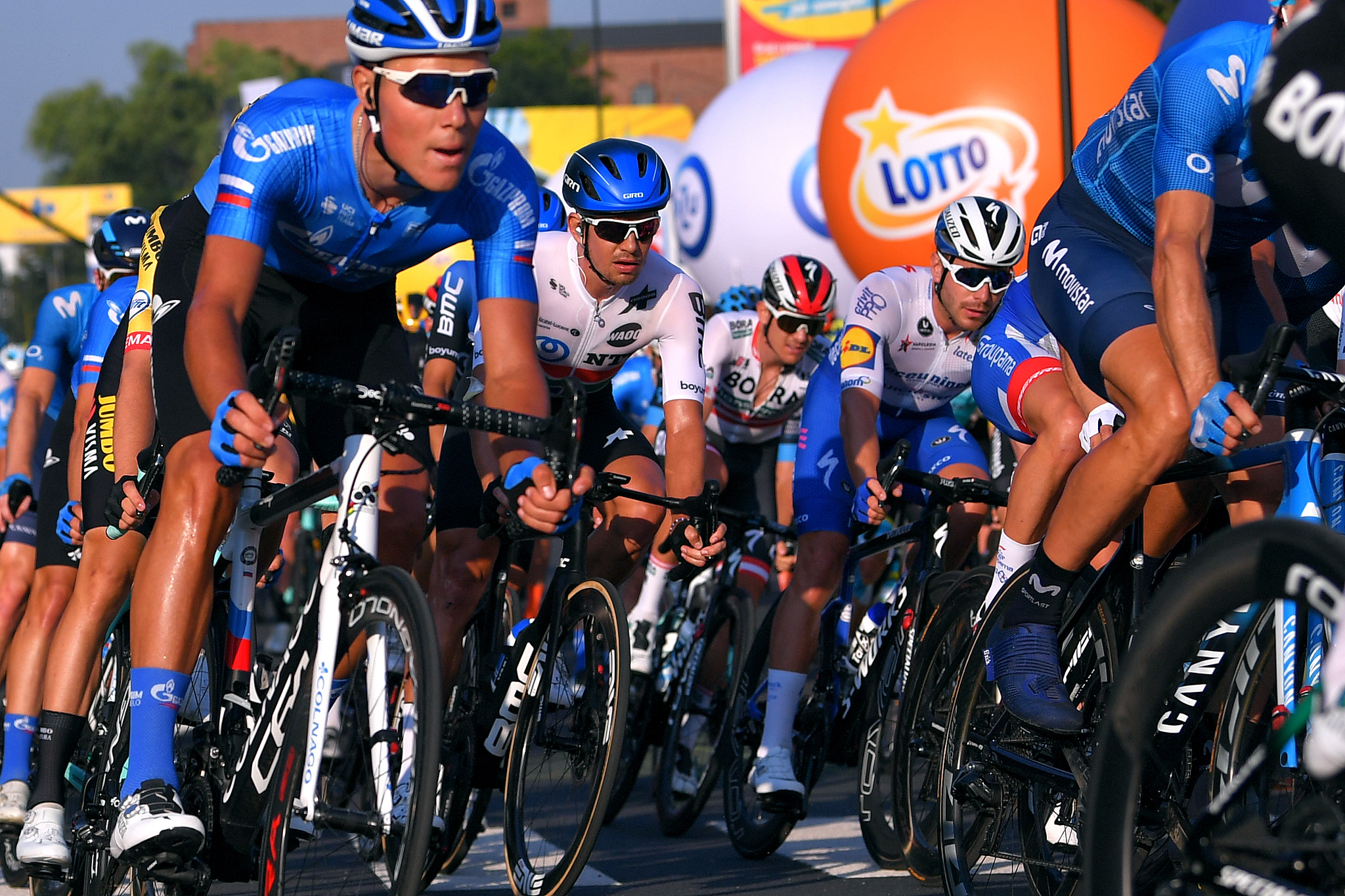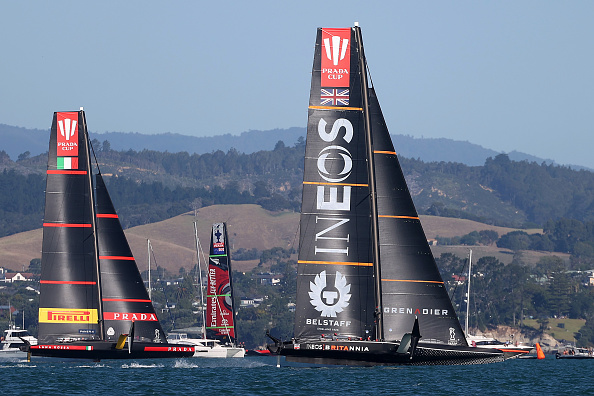
Players of Manchester City and Manchester United await a corner kick during the Carabao Cup semi-final match at Old Trafford in Manchester, England, January 6, 2021. /Getty
Players of Manchester City and Manchester United await a corner kick during the Carabao Cup semi-final match at Old Trafford in Manchester, England, January 6, 2021. /Getty
"Sport is floating on a sea of high carbon sponsorship," according to a new report released Monday that is calling on top sports teams and organizations to cut ties with high-polluting companies.
The report "Sweat not oil" by the New Weather Institute, the KR Foundation and a number of other climate change groups, identified over 250 sponsorship deals between some of the world's biggest sports' names on the one hand, and carmakers, airlines and gas companies on the other. And this despite pledges by many teams and federations to combat the climate crisis.
Sponsorship deals were found across 13 major sports from football and cycling to athletics, cricket and even sailing. Among others, the report noted that FIFA and UEFA, the international and European football associations, are sponsored by car manufacturers like Hyundai and Volkswagen, airline Qatar Airways and Russian gas company Gazprom.
Top European football teams such as Arsenal, Manchester United, or Real Madrid play in jerseys and stadia that boast names like Emirates, Chevrolet or Jeep; cycling's Tour de France is sponsored by Skoda; the international basketball federation FIBA is partnered with Aeroflot; while golf's PGA Tour is associated with BMW.
At the recent tennis Australian Open, "prominent courtside sponsors included a fossil fuel company, an airline and a carmaker," the report noted.
Even the Paralympics are sponsored by Toyota and gas company BP, it said, raising the alarm about "the scale and penetrating impact of high carbon sponsorship in sports."

Cyclists with Team Gazprom - Rusvelo, NTT Pro Cycling Team and Team Deceuninck during the 77th Tour of Poland 2020 in Zabrze, Poland, August 6, 2020. /Getty
Cyclists with Team Gazprom - Rusvelo, NTT Pro Cycling Team and Team Deceuninck during the 77th Tour of Poland 2020 in Zabrze, Poland, August 6, 2020. /Getty
By offering auto, gas and airline companies a platform, sports teams and federations are directly contributing to carbon emissions that need to be urgently capped to avoid disastrous climate consequences, the report criticized.
"Direct association with promoting high carbon products and lifestyles not only contradicts the pledges of climate action that many clubs and sports bodies are beginning to endorse, but it poses an increasing reputation risk to the sport, which is meant to represent a better, healthier way of life," it added.
These sponsorship deals are especially problematic at a time when sport itself is suffering the consequences of the climate crisis, with events canceled due to natural disasters, extreme heatwaves or pollution, and rising temperatures wreaking havoc on outdoor winter sports.
'Greenwashing'
For the auto industry, under pressure to do more to combat global warming, sport sponsorship deals have long been attractive.
A 2017 report found car companies spent 68 percent of their sponsorship money on sports, compared to just 17 percent on entertainment and four percent on the arts.
In 2019, the auto industry reportedly forked out $5.9 billion on sports sponsorship deals, making it the second-biggest spender in the sector.
Environmental groups say this is all part of a "greenwashing" effort.
"Companies use it as a marketing tool to create a positive public image for themselves or increase their TV coverage," the "Sweat not oil" report said of the deals.

INEOS Team UK lead race six over Prada Luna Rossa with Emirates Team New Zealand sailing off the course (C) during the 2021 Prada Cup Final in Auckland, New Zealand, February 20, 2021. /Getty
INEOS Team UK lead race six over Prada Luna Rossa with Emirates Team New Zealand sailing off the course (C) during the 2021 Prada Cup Final in Auckland, New Zealand, February 20, 2021. /Getty
Among others, it pointed to Ineos, a petrochemical company that has come under fire for its use of fracking and has recently poured money into cycling, sailing, football and hockey teams.
"Ineos' sponsorship of cycling is seen as an attempt to 'sportswash' its image by attaching its name to a high-profile cycling team and a green sport," the report concluded, although the company has refuted such allegations in the past.
With millions of fans tuning in to watch events and competitions every year, sports teams and associations have the power and reach to bring about change, the report's authors said.
Plenty of teams and competitions already rely on sportswear brands, mobile phone operators, credit card providers, and food and drinks companies for sponsorship money.
And the phasing out over the past two decades of tobacco sponsors, once ubiquitous in sports, over health concerns shows this can be done.
"Sport needs to up its game and adopts policies that reject high carbon sponsors," the report urged. The first step would be for teams and federations to "turn down any… companies promoting clearly high carbon lifestyles, products, and services, especially those in the automotive, airlines and fossil fuel industries."

